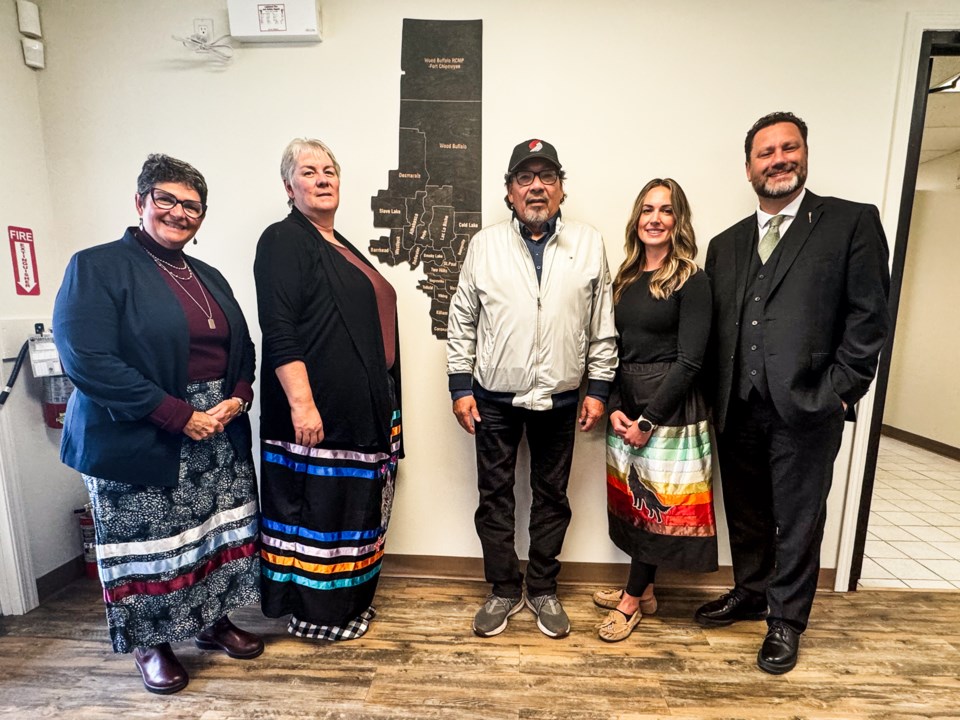LAKELAND – Victim Service Units (VSU) across Eastern Alberta have come together to form the Eastern Alberta Regional Victim Services Society (EARVSS). The aim is to enable a more consistent service and increased efficiency across the region to support victims.
EARVSS serves 24 communities and surrounding areas within the Eastern Alberta District.
On Sept. 23, EARVSS officially opened its central office in St. Paul. A pipe ceremony led by Elder Rick Makokis of the Mannawanis Native Friendship Centre (MNFC), and attended by delegates from the RCMP, local politicians, and several community organizations, was held in honour of the opening.
Melody Littell, Director of Operations for EARVSS, said communities can expect key operational changes with the transition, including increased funding stability, which should allow for more frontline navigators dedicated to each community.
“This stable funding eliminates the past need for individual communities to rely on fundraising to maintain operations,” she explained.
“The amalgamation also brings greater consistency across communities, ensuring that all victims receive uniform and high-quality support,” added Littell. The change should ensure victims receive timely help as they also often must navigate the justice system.
If a case file does need to be transferred, navigators will be able to collaborate with each other to ensure continuity in client support.
“Communities will benefit from streamlined processes and increased opportunities for training and knowledge enhancement due to heightened regional collaboration. With navigators working closely within RCMP detachments and across the district, the overall efficiency and quality of victim services will be enhanced,” said Littell.
Collaboration
Collaboration, according to the director, is a priority for the EARVSS.
“We are part of the community, and the people we serve are part of this community,” said Littel. “They need to know that their community is there to support them.”
This is why it is important to come together and build relationships, she said. By collaborating closely with law enforcement and other local organizations, the society is hoping to ensure seamless support for victims, she reiterated, noting she believes collaboration is crucial in directing victims to the right services when they need them most.
“If I have someone who is hurting or I can’t help them,” perhaps another agency would be able to do so, explained Littel. In addition to its other duties, referral is also among the Victim Services Society’s key responsibilities.
“So, I need to know what those agencies do so that I can help people get to the right place.”
Makokis agreed. He has helped train Victim Services staff in the past. “When you build relationships . . . you're [also] building understanding,” he said.
Collaboration also enables community organizations to be aware of each other’s responsibilities and what they are up to, which allows the community to form a more cohesive relationship, said Makokis.
“We have to share that same vision of: how can we work together? How can we work closely together to build a healthy future?” he said. “How can we do it in a kind and loving way?”
And the answer, according to Makokis, is by “working in collaboration with each other.”
“Health, happiness, love, compassion - that's what we want to build towards,” he said. “Because it’s not about us. It’s about tomorrow.”
Healing
One of the ultimate goals of EARVSS is also to help victims heal, which can involve helping directing people, “so that they can help heal themselves and move forward – as Rick [Makokis] said – into the future,” said Littell.
“We have to help, because the future – it depends on us healing where we’re at now,” she said. “We want to see people heal [from] what hurts them, because you can then be a better version of yourself.”
Not alone
Victims can often feel alone, said Littell. Something she has experienced herself, having faced different tragedies and traumas.
“Very rarely was someone there.”
This inspired her to pursue her current line of work.
“It's been my personal philosophy that we’re here to support. You don't have to remember who I am. You don't have to know my name. You don't have to remember any of that,” she said. “Just remember that you're not alone, because some of the stuff we deal with is extremely overwhelming.”
And for someone who is in a very dark place, to feel that they are not alone is very important, according to the director. “That’s why I do it. To support people.”
To reach EARVSS for support, individuals can contact their local RCMP detachment or call the Society at 1-587-487-2505.
In times of crisis, people are urged to call 911, as EARVSS cannot provide emergency response services directly.
“If you are in the middle of a crisis, please always call 911,” said Littell.
But if something happened, leading to a situation of shock or trauma, and an individual is unsure of what to do after, Littell encourages them to reach out to EARVSS.
“Once the shock has worn away, and you might go, ‘I need some help.’ Please just call,” she said.
And if an individual has questions, Littell also encourages them to ask those questions.
“Truly, if you don’t understand something . . . or are unsure, please ask. Because if we don’t know, we will tell you we don’t know - but we will try and find someone who does [know].”



